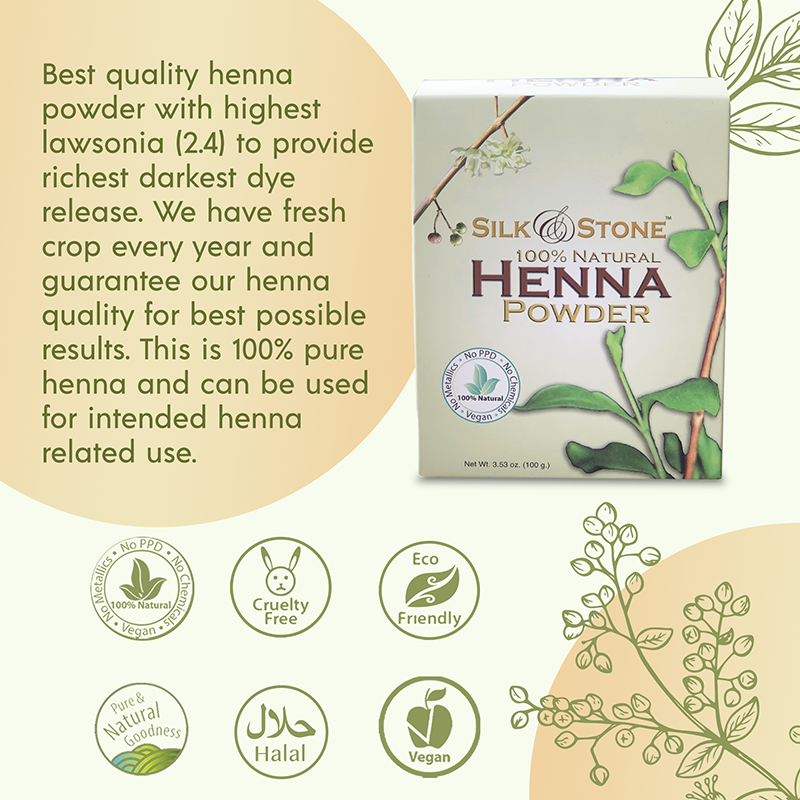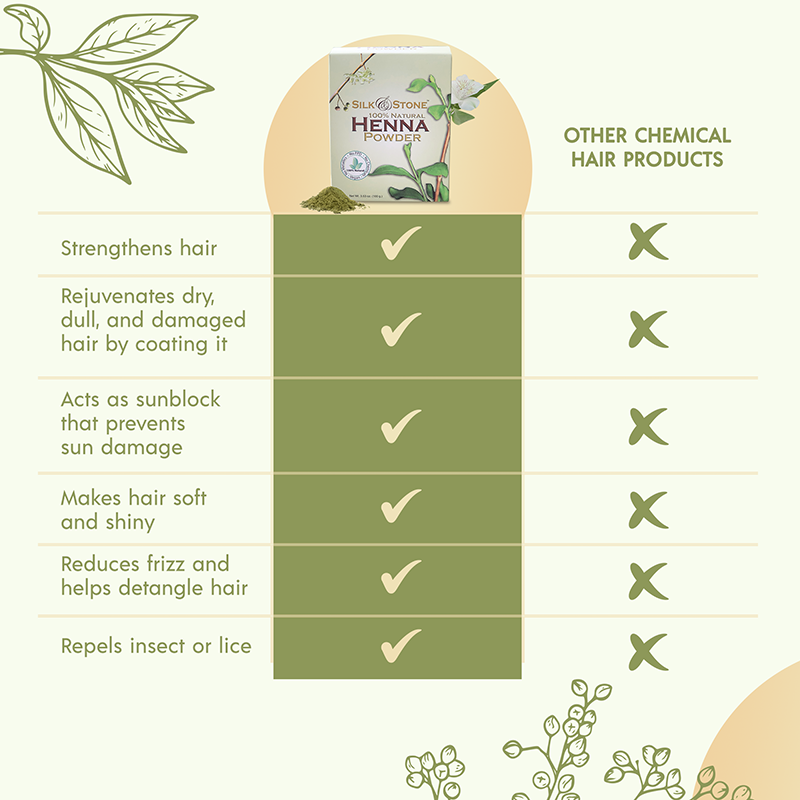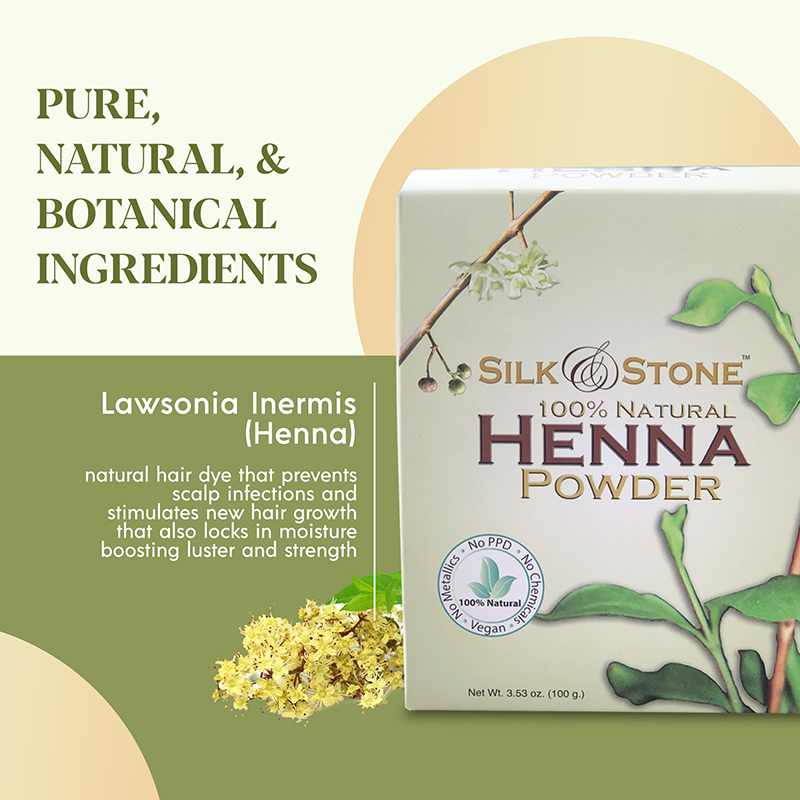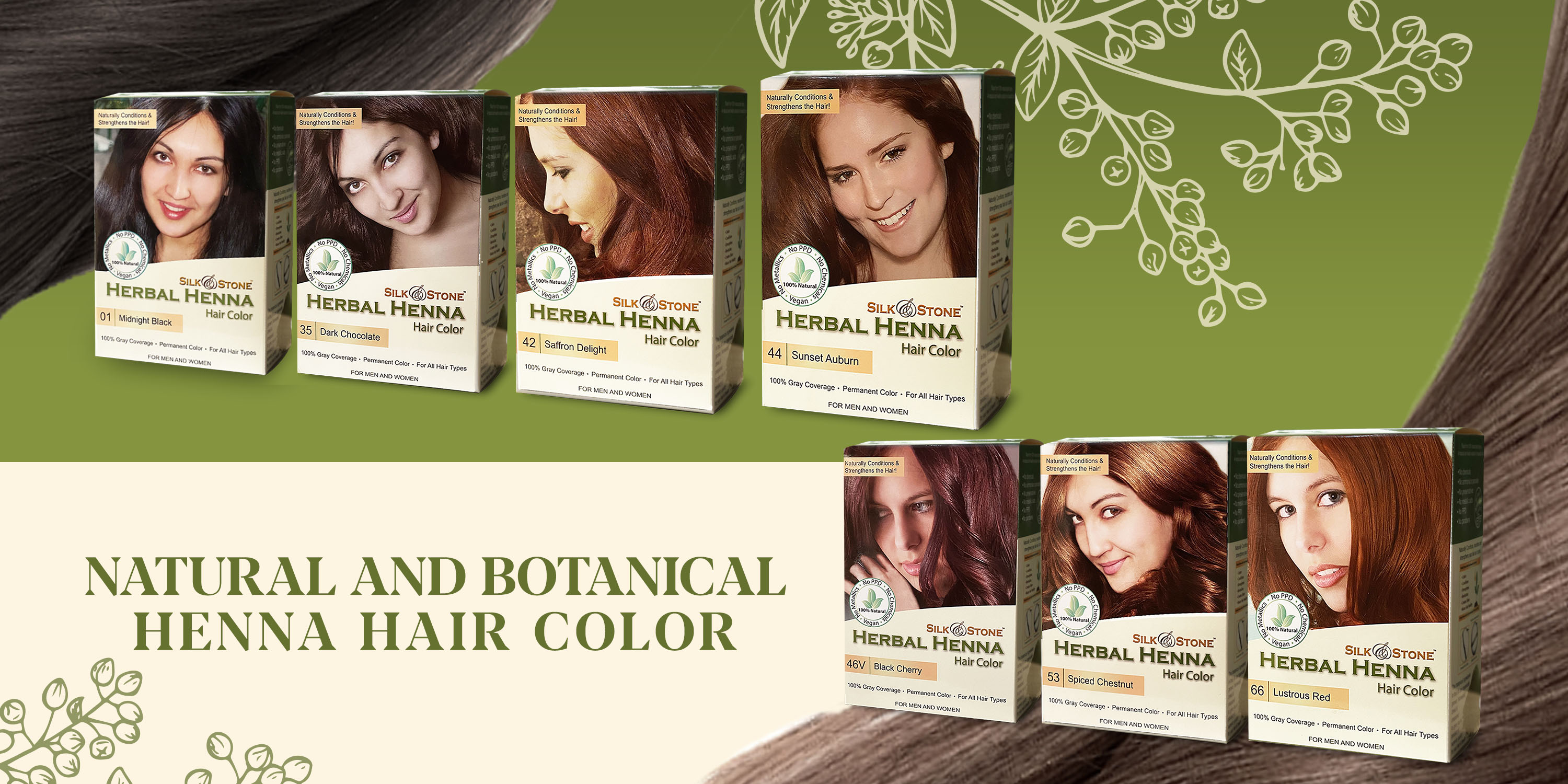 |
|
At Silk & Stone, we care about you, your education, and your health. We conduct OUR OWN testing rather than relying on what we read or hear. We do our own research, testing and experimentation, before making any of our products. This is done to ensure only the best products with the best results for your hair, skin, and overall health. We also use ingredients of the highest quality to make our products. We all know that everything you read on the internet is not true. Misinformation about henna hair dye is confusing for those considering using henna for their hair. Separating fact from fiction can make all the difference in your henna outcome.
Below are the top ten major myths about henna hair dye that new clients consistently ask us about. If you have any enquiries or anything you would like to learn more about, I encourage you to send us an email at support@silknstone.com - our team is always happy to help.
1. MYTH: Using Lemon Juice in My Henna Hair Mix Will Give Me Better Results.
Lemon juice is commonly being used in henna mixes for the hair to release more dye from the plant and to make it more permanent.
REALITY: The reason people add lemon juice into their henna mixes is primarily because of its involvement in increasing the effects of the henna. Making the results darker or richer. This happens because the lemon juice breaks down the lawsone in the henna, thus releasing more of the dye. The results are seen commonly on henna for the skin, creating a darker more desirable stain, but taking that into consideration, the addition of lemon juice into one’s henna hair mix can actually be very damaging.
Lemon juice is very acidic in nature, a quality that will strip your hair of its natural oils and color. The repeated usage of lemon juice can make your hair brittle. Henna is a plant that rejuvenates, conditions and strengthens the hair. When it is mixed with lemon juice, the effects are counteracted; the lemon juice works against the henna, preventing it from doing its job, that of making the hair healthier.
Alternative Solution: The dye release can also be achieved by using warm to hot water (preferably around 70°). This will break down the lawsone and release more dye. Leaving the henna to oxidize in a warm place in an airtight container overnight will also give you a richer color. This is equal to leaving henna in your hair for 9-10 hours.
Traditionally in Pakistan and India the henna mix for the hair consists of only henna, water and tea; nothing else. A simple recipe that has amazing effects!
2. MYTH: Henna Powder Should Be Kept Frozen
Many people have a huge freezer designated just to henna powder. They freeze the henna (in its original packaging) as soon as they get it, in order to give it a longer shelf life. This has become a major trend.
REALITY: Henna does not need to be kept frozen unless it has been mixed into a paste. If the powder is kept in a dark, airtight container, it will stay fresh for years. It is best to store it within such a container in its original packaging and then to take out only what you need.
You need a desirable amount of space within a freezer, or perhaps a freezer solely dedicated to this purpose. Some common issues associated with freezing henna:
-
When henna powder is kept frozen, condensation occurs and the moisture penetrates the inside of the package. When you remove the package from the freezer and open it, you will see that the henna powder may retain moisture and clumps.
-
If the powder is not used all at once or if it is restored in the freezer, its freshness will be lost faster.
 |
 |
|
Buy Pure Henna Powder |
3. MYTH: Do Not Use Any Metal Containers to Make Your Mix
There is information all over the internet, henna hair colors and books about not using metal containers when mixing your henna.
REALITY: Yes it is true that metal containers should not be used when mixing your henna, but the exception to this rule is stainless steel. In many countries, aluminum and iron containers are popular for cooking and as kitchen utensils. Metals like these will react with the henna and may not be healthy for your skin or overall health. But stainless steel does not react with any of the Silk & Stone herbal powders including henna. It is also very easy to wash and sanitize.
Alternative Solution: use stainless steel, ceramic or glass containers for making your henna mix. Be sure to wash your containers thoroughly to prevent residue on the container.
4. MYTH: Henna is Bad for the Hair
There is a popular myth that henna is bad for the hair and many stylists promote this idea without confirmation.
REALITY: The only henna that is bad for the hair and scalp is Black Henna, alternatively known as: ‘Kali Mehndi’. This henna has a very toxic chemical in it called PPD (paraphenylenediamine), a chemical that is also present in most dark hair dyes on the market. It is known to make the hair dyes more permanent and result in a darker (brown to black) hair color. When mixed into henna, it turns the natural red into a black stain. What most stylists don’t realize is that this chemical is just as harmful in the hair colors they use as it is in the henna. PPD in henna is banned in the USA but, for some reason, it has not been banned in the hair dyes. Even though there have been serious reactions, to the scalp and hair including burns, blisters, scars, hospitalization, and even death.
Hairdressers often tell their clients that henna is really bad for the hair and will break the hair or make it fall out. In order to synthetically color the hair, the cuticle has to be lifted so that the hair color can penetrate into the hair to give you the desired color. In order to lift the cuticle, harsh chemicals have to be used, which permanently damage the cuticle, making your hair weak and brittle.
When henna is applied to the hair, it coats the hair strands and pushes the cuticle back into place. This is why hennaed hair cannot be easily synthetically colored.
So in order to color the hair that has been hennaed, your hairdresser has to use a much stronger and harsher chemical to reopen (damage) the cuticle so that color can penetrate the hair. This can make the hair break and, quite literally, disintegrate. So it is not the henna that makes the hair break but the chemicals applied to color over the hennaed hair that damage the hair.
Anything with PPD should be avoided including chemical hair dyes that contain this substance. Henna in its natural form is safe to use and, unlike traditional hair dyes, it is healing, conditioning and rejuvenating for the hair and scalp. Chemical dyes are worse for your hair and health the more you use them but henna and herbal hair colors (as long as they are used in their pure forms without additives, preservatives, chemicals, etc.) are healthier the more they are used. Also, it is best to not color with synthetic dye over hennaed hair. Allow your hair to grow out before recoloring with chemical dyes. For optimal results and hair health, choose only hair dyes that are natural and with ingredients that are in their pure form.
5. MYTH: Henna Makes Your Hair Brittle, Especially if Used Over Bleached Hair
I watched a home video online once, which mentioned that henna made hair brittle, it was bad for the hair and if used over bleached hair, it will make the hair break off. The video did not mention what kind of henna it was.
REALITY: If you are using henna with additives, preservatives or chemicals like PPD (as mentioned above) it will damage your hair as well as your scalp, and possibly make the hair thin and brittle. Using too much lemon juice in your mix can also make your hair brittle, because it is high in acid and will break down the hair.
Henna in its pure form makes the hair strong. It binds to keratin, which is the protein substance that hair is made of. The top layer of our skin (stratum corneum) is also made of keratinized cells and so the henna stains the skin very well.
Hair is made of very dense keratinized cells so the henna penetrates and coats the hair much easier than the skin and gives you a rich hair color. It makes the hair feel thicker, conditions the hair, and closes the hair shaft so foreign particles cannot penetrate the hair. Thus, leaving your hair healthier and stronger.
With repeated use, you will see how much stronger and healthier the hair becomes. It is also a great product to use to bring life to dry, dull, and damaged hair. Mix your henna with warm water (approximately 70°) or black tea and avoid using acidic substances like lemon juice, lime juice, wine, citric acid, etc.
6. MYTH: Henna Makes Your Hair Coarse or Straw-Like
REALITY: Chemically treated hair can often already be damaged. The usage of another product on top might just enhance your ability to see this, rather than masking the true damage. The henna itself is not adding to this effect, per say. Adding henna to the previously chemically colored, bleached, or relaxed hair coats the already treated hair, making it thicker and feel rougher. Take a look at the hair near the roots where there are no chemicals. Do those feel just as course? It is highly unlikely. They should feel soft and pleasant. Once the chemical hair grows out, your hair will in turn return to its soft and beautiful natural self.
7. MYTH: Henna Makes Your Hair Fall
Also view MYTH #4 for hair breakage and hair fall.
REALITY: Henna hair color naturally strengthens the hair and makes it healthy. It helps prevent the hair from thinning, breaking and falling. Continued use helps further strengthen the hair. If your hair falls after the first application, chances are that those hairs were damaged and loose, already prepared to come out. With continued applications, you should see less breakage and fall. If for some reason henna hair dye continues to make your hair fall, you should consult a doctor. There might be something else going on that might be making your hair fall.
Just because henna is all-natural, like any other natural products, it does not mean it will work for everyone. This is why we always recommend you do an allergy test before using henna and herbal hair colors, especially if you are prone to sensitivities.
8. MYTH: You Can’t Henna Over Chemically Colored Hair
REALITY: Some say it is difficult to henna over chemically colored hair or if you dye your hair over chemical colors, your hair will turn green. This is possible if your henna has additives in it. The pure Silk & Stone Henna does not turn green. But there is also the possibility, depending upon the previous chemical use, that your hair could turn green if you use indigo with your henna. Usually the green goes away after a couple of days as the indigo settles in the hair. Be sure to do a strand test before applying to full hair and make sure your hair is clean, without any additional product in it.
9. MYTH: Henna Hair Colors are Only Red
REALITY: The lawsone present in the henna gives an orange to red stain. Turning your hair red, or in the case of white or blonde hair, orange, when used alone. Henna can be mixed with other plants like indigo to make a variety of shades including dark brown and black.
The Silk & Stone Herbal Henna Hair Colors are 100% pure and natural, ranging from light brown to strawberry blondes, even to reds, browns, purple and black. Most of the tones are a natural earthy color and look very beautiful. They also color 100% of the grays and are great for all hair types.
Vibrant colors like bright green, blue, bright yellow, etc. are not possible with natural hair dyes.
The fun thing about henna is that it can be mixed with other plant ingredients for a variety of hair color shades and conditioning effects. Henna mixed with botanical fruits and herbs like indigo, amla, etc. can create a variety of different hair colors from light golden to deep black.
A 100% natural plant dye for your hair. See all Herbal Henna Hair Colors
10. MYTH: You Can’t Chemically Bleach or Color Your Hair After Hennaing
Most people are afraid to dye their hair with henna because they feel they will be stuck with it until the hair grows out and will not be able to chemically color over the henna.
REALITY: Depending upon how many times your hair has been hennaed, it might take a few tries to get the color you want with the chemical dyes. But, as long as you used pure and natural henna with no chemicals, additives or preservatives, you can dye your hair with synthetic colors.
It is best to do a strand test before applying the hair color over hennaed hair to prevent any undesired results. Note that if you have indigo in your hair, the hair may turn a greenish color depending upon the chemical dye used.
Once your hair has been hennaed, it requires a longer processing time to bleach the hair but that does not remove it from being a possibility. The hair will feel dull and lifeless but that is the case with bleaching over any type of hair, thus we recommend against it. Ensure that you keep your hair conditioned very well to protect it from more damage.
-----------------------------------------------------------------------------------------------------------
Need Help?
In the Portland Area? Let One of Our Experts Help You. Book a Consultation and Strand Test!
How Do I know What Henna to Buy?
There are 3 main factors to look for before purchasing the best henna for your hair:
- 100% pure & natural: It is very important to use henna that is 100% pure and natural and made solely from the leaves of the henna plant. It should be free of any chemicals, preservatives, metals and other substances.
- It is packaged properly to keep fresh: The henna should be packaged properly in an airtight food-grade package away from moisture and light. Henna is sensitive to moisture and light and will demise, giving you a very faint color or no color at all.
- It is finely ground: The henna should be ground super-fine so that it washes out of the hair easily and does not leave residue in the hair when applied.
Try Silk & Stone Henna powder or premixed Herbal Henna Hair Colors and herbal shampoo for color treated hair! The ingredients are organically grown and from the latest crop. All of our hair products are vegan, gluten free, cruelty free, chemical and preservative free and a healthy choice for your hair needs.
The Henna Hair Dye You Never Want to Purchase
Be aware of henna hair dyes that contain substances other than henna. Common chemicals and substances you will find in henna that is made for the hair (which you don’t want to buy) include:
- PPD (paraphenylenediamine)- a very toxic chemical
- tartaric acid
- citric acid
- red clay (this is a chemical and not a clay)
- metals
- foreign particles (lint, bark, stems, rice, etc.)
- preservatives
- fragrance
- green sand (this is often used to make it look fresher, although the color of the henna does not determine its quality)
- large particles (it may not be ground properly or may have foreign particles in it)
Other Henna Resources:
Where to Buy Henna Tattoo Supplies?
Henna Tattoo Techniques and Tutorial




